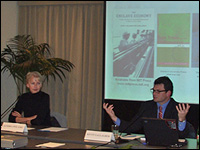Registration
You will receive an email confirming your registration.
IMGXYZ804IMGZYX The Carnegie Endowment hosted a discussion with Kevin Gallagher of his new book, The Enclave Economy: Foreign Investment and Sustainable Development in Mexico’s Silicon Valley, on October 26, 2007. The book is based on a comprehensive four-year study of the 1990s foreign investment -led expansion of the high technology sector in the Mexican state of Jalisco, and the extent to which it contributed to the country’s economic, social and environmental development.
Authors Gallagher and Lyuba Zarsky find that the benefits of the investment influx were largely limited to the Jaliscan “enclave”. Mexico’s early 1990s liberalization and proximity to the United States, coupled with the signing of NAFTA, contributed to a flood of investment from flagship American IT firms to Mexico’s “electronics clusters” amidst the high tech-driven economic boom. Mexico’s hope was that benefits would “spill over” from the clusters to the broader economy, creating backward linkages to domestic companies, introducing more advanced and environmentally sound standards, and producing skilled workers.
However the results fell far short of expectations. Foreign investment had the adverse effect of “crowding out” domestic investment and resulted in minimal gains in net investment. U.S. IT firms with operations in Jalisco also imported a staggering 98% of inputs, and as a result the domestic firms that supplied Mexico’s high tech firms prior to the foreign incursion declined by 80%. While the many new plants that were constructed were environmentally state-of-the-art, there were few ripple effects because the supply chain was located elsewhere. Furthermore, little development of human capital occurred because electronics workers typically only received temporary contracts and basic training. In a particularly unwelcome blow, an American economic slowdown coupled with an exodus of IT manufacturing to China led to a 25% decrease in Jalisco’s high tech employment in a period of a little over a year following 2001.
Looking for the causes of the disappointing performance, Gallagher argued that barriers to entry for domestic firms, compounded by government policies that favored foreign over domestic investment and inadequate research and development spending by both government and firms undercut the potential gains to Mexico. Gallagher concluded that FDI, though “vitally important,” is a “means to development, not an end in itself” and suggested that complementary policies designed to include domestic firms in supply chains and develop human capital could ensure that foreign investment contributes more to development. Complementary government policy is necessary to capture the potential of FDI.
In a question-and-answer session, Jerry Levinson, a professor at American University’s Washington College of Law, questioned whether Gallagher’s recommended policies ran contrary to NAFTA’s Chapter 11, which he said explicitly prohibits members from implementing legislation favoring domestic manufacturing. Gallagher maintained that sufficient policy space existed within NAFTA to “engage in constructive policies,” including, for example, the provision by Mexican banks of credit to small- and medium-sized domestic manufacturers. However, he agreed that NAFTA constrains Mexico’s ability to implement policies that could contribute to its development and argued that the trade agreement “doesn’t get the balance right.”
Scott Vaughan of the Organization of American States wondered whether the current wage differential between Chinese and Mexican high tech workers was too great for Mexican manufacturing to grow and, also, whether China was doing a better job of harnessing its skyrocketing FDI. Gallagher responded that while the wage difference is great (he noted that a Mexican IT worker currently earns, on average, 3 to 4 times more than a similarly employed individual in China) it would always have an enviable advantage in its proximity the United States. He also noted that China is “using its leverage,” striking favorable FDI deals that provide domestic benefits such as funding for high schools and assistance in government research and design programs, though it clearly needs to ameliorate its environmental and labor conditions.
Gallagher was also asked to explain the “maquila mindset.” He characterized it as a “belief that liberalization alone will lead to growth and development” even in light of extensive empirical evidence to the contrary. He expressed regret that there is little middle ground on economic policy in contemporary Mexican politics and cited as an example the latest presidential election, in which eventual victor Felipe Calderon argued for a deepening of the current “maquiladora” model, while challenger Andrés Manuel López Obrador advocated a return to economic nationalism.
